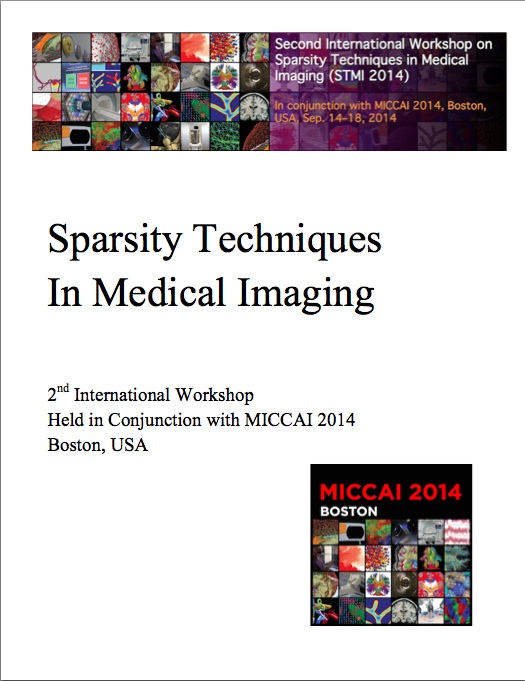Final Program
In response to a call for papers, a total of 23 papers were initially submitted to the workshop. These papers underwent a rigorous, double-blind peer-review process, with each paper being reviewed by a minimum of 2 reviewers, and in many cases, by 3 expert reviewers from the Program Committee. Based on the results of this review, 14 papers were accepted by the workshop for presentation. All the accepted papers were revised by
incorporating the reviewers' comments and re-submitted by the authors to be included in this proceedings volume. 4 papers have been selected for 15-minute podium presentation during the 2 plenary oral sessions. The rest 10 papers have been selected for poster presentation.
Workshop Proceeding with all papers available for download

8:00 - 8:30 Registration, speaker check-in and poster setup
8:00 - 8:50 Poster Session
8:50 - 9:00 Opening Remarks
9:00 - 9:45 Plenary Talk 1 (35 min + 10 min Q & A)
Talk Title: Sparsity, Low Rank, and Learning - Data and Physics-Driven Models in Medical Image Reconstruction
Dr. Yoram Bresler
Professor, Department of Electrical and Computer Engineering, Department Bioengineering, University of Illinois, Urbana-Champaign
Abstract:Sparsity, data-driven learning of signal models, and low rank modeling, have emerged as powerful paradigms in image reconstruction. These paradigms are often differently motivated: limited data; the limitations of analytical models for images; and physical models of the signal generation or acquisition. We describe the application of these paradigms for image reconstruction in several medical imaging modalities: MRI, CT, PET, and optical. Highlights include the following: (i) blind compressed sensing - or data-driven learning of sparsifying transforms in MRI and CT reconstruction, which improves on approaches involving learnt synthesis dictionaries, at much lower computational cost; (ii) a combination of the underlying physics with sparse modeling, to enable a fast and accurate non-iterative solution to the non-linear inverse problem in optical imaging; and (iii) physics-based low rank object modeling in dynamic MRI and dynamic PET reconstruction.
9:45 - 10:15 Oral Presentation: Medical Image Analysis with Sparsity (Each oral presentation up to 12 min + 3 min Q & A)Abstract: This talk will focus on the convergence medical imaging and machine learning techniques for the discovery and quantification of clinically useful information from medical images. The first part of the talk will describe machine learning techniques based on sparsity that can be used for image reconstruction, e.g. the acceleration of MR imaging. The second part will discuss model-based approaches that employ statistical as well as probabilistic approaches for segmentation. In particular, we will focus on segmentation techniques that combine patch-based approaches such as dictionary learning with sparsity to improve the accuracy and robustness of the segmentation approaches.